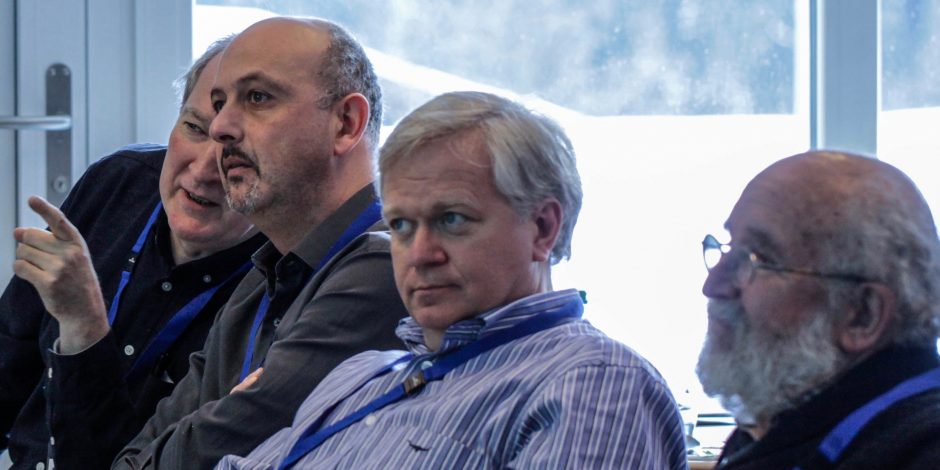Giving a good talk

By Audra Baleisis
In the last issue of the Insider, you had a chance to read a variety of opinions from PlanetS project leaders about what is necessary for a good science talk (for a Journal Club, group seminar, conference, or job talk). With so many different voices, sometimes saying different things, it can be hard to know what to take away and apply to your own talks. Although I do not have one right answer for you, I’d like to take a look at the responses through a lens of social science analysis. It means looking at the content of what is said and considering it in terms of the students who are supposed to be learning what it means to speak as a scientist.

Gifted speakers: John F. Kennedy announcing his goal of sending an American to the Moon, Nobel Prize laureate Malala Yousafzai defending girls’ right to education, primatologist Jane Goodall fighting to save endangered species, and Martin Luther King starting with: “I Have a Dream”. (Images: NASA/Nobelprize.org/TED.com/Wikimedia Commons)
Journal Club
The responses in this section are mixed – some professors talk about preparation and presentation for this event in words that imply expert analysis: bigger picture, critical discussion, clear overview, explain the paper including limitations and flaws. This is a big job for a new, or even advanced, student. This takes time. And it can help immensely to see others doing it, modelling what it should look like, and getting help your first few times in learning how to “read” a scientific paper. Don’t be shy to ask for help and feedback before your presentation, because this is a complex task, even if senior scientists find it easy. Remember they have had many years to learn how to do it.
Research Group Seminar
Again, there is a mix of responses – some present this as a casual activity, implying a low stakes event, and others talk about it as involving a lot of thought about your research, about how to present to the audience, about the bigger picture and why your work is important. And, the responses indicate you should display an appropriate mix of showing your successes and failures (or problems you’re having). This means that as you progress in your doctorate and postdoc, you should be learning not only your science and methodology, but also what is judged to be appropriate by the academic community. Again, this is a complex task, so expect to observe others who you think are doing well, ask more senior members of your group for help on any of the components of the talk that you find difficult – the motivation, the science, the plots, the presentation style, how to answer questions, etc. You are being asked to learn many different skills. It is good to get help with them, whether from your group, your peers, or a professional development course.
Conference Talk
Here, the project leaders’ responses were more similar, and there is a more coherent view. You are at a conference, giving a talk in order to sell yourself, your work, to make sure people cite you or your group, and to present yourself to future employers. Keep this talk focused and simple: present one idea, focus on one message, and “rehearse a lot”, “prepare very seriously”, “practice speaking.” Although the skills required here are also complex, this last set of replies, about the importance of preparation, indicates that this is a higher stakes event than a Journal Club or a research group talk, and preparation and practice is explicitly expected. That doesn’t mean you shouldn’t prepare for the other events, just that your advisors may have forgotten all that you are still learning and think a Journal Club is very easy to present.
Job Talk
This was the question I was most interested to see answers for when I emailed the various project leaders with my questions, because we have all seen prominent scientists give horrible talks as well as people give great talks but not get the job. I really wanted people to talk about what they looked for when hiring, with the expectation that there would be a range of answers, just as there is a variety of personal styles among the PlanetS professors.
There is some variation in answers – from the notion that you should already sound and act like a professor if you are applying for that kind of position, to the idea that you should be honest about the work you have actually done. In a sense, you should be confident but arrogance is not appreciated. Although this is a simple statement to write on a page, it is also a complicated thing to achieve when you have multiple listeners with their own definitions of what behaviors indicate confidence and arrogance. There are gender and cultural aspects to these notions. It also means you will not please everyone at the same time, which can be a relief. If you can find your personal strengths, and hone these skills, then you are doing the best you can.
For myself, I realized, when I was studying how norms and rules for giving a talk are constructed, that what is acceptable is constantly under construction. We all look to our peers to see how they react, to give us a sense of what is okay. If people make fun of or criticize something that someone does, this provides a small bit of pushback against that behavior – “don’t do that again”. On the other hand, if you try out a new behavior, one that isn’t commonly used in the group, and you act as if it is acceptable (i.e. you don’t explain it or apologize for it), you send a signal to the group that provides a small bit of push in favor of the behavior. This made me rethink how I gave talks, to make them more suited to my strengths (writing) and less susceptible to my weaknesses (impromptu speaking). I started to write out the text for my talks, practice it, and even read from it during a presentation, as well as sit down to give the talk. I acted as if it was okay, and no one commented on the contrary.
So the task becomes to find ways to harness your strengths in the presentations you do give. Do not try to give a talk without notes if this makes you too nervous. Do not try to use flashy slides if you are a more understated person. Finally, note that many of the responses talk about an inclination to forgive many less-than-perfect aspects of a talk. All the professors agreed on what was most important – show that you are motivated, show that you are excited about your work, and show what parts of it are your contribution.
InsiderS No. 6: http://nccr-planets.ch/what-makes-a-good-science-talk/
Categories: Internal Newsletter
